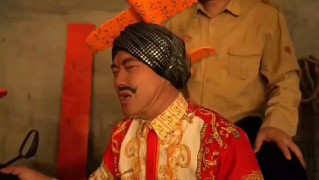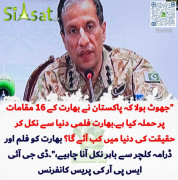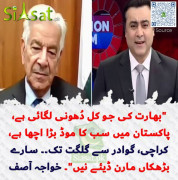Re: Ahmed Shah Masood's brillient response to Talban
Is this the same UNO u talkin about.....
[h=2]Afghanistan, Opium and the Taliban[/h]
 JALALABAD, Afghanistan (February 15, 2001 8:19
JALALABAD, Afghanistan (February 15, 2001 8:19
p.m. EST
U.N. drug control officers said the Taliban religious militia has nearly
wiped out opium production in Afghanistan -- once the world's largest producer
-- since banning poppy cultivation last summer.
A 12-member team from the U.N. Drug Control Program spent two weeks searching
most of the nation's largest opium-producing areas and found so few poppies that
they do not expect any opium to come out of Afghanistan this year.
"We are not just guessing. We have seen the proof in the fields," said
Bernard Frahi, regional director for the U.N. program in Afghanistan and
Pakistan. He laid out photographs of vast tracts of land cultivated with wheat
alongside pictures of the same fields taken a year earlier -- a sea of blood-red
poppies.
A State Department official said Thursday all the information the United
States has received so far indicates the poppy crop had decreased, but he did
not believe it was eliminated.
Last year, Afghanistan produced nearly 4,000 tons of opium, about 75 percent
of the world's supply, U.N. officials said. Opium -- the milky substance drained
from the poppy plant -- is converted into heroin and sold in Europe and North
America. The 1999 output was a world record for opium production, the United
Nations said -- more than all other countries combined, including the "Golden
Triangle," where the borders of Thailand, Laos and Myanmar meet.
Mullah Mohammed Omar, the Taliban's supreme leader, banned poppy growing
before the November planting season and augmented it with a religious edict
making it contrary to the tenets of Islam.
The Taliban, which has imposed a strict brand of Islam in the 95 percent of
Afghanistan it controls, has set fire to heroin laboratories and jailed farmers
until they agreed to destroy their poppy crops.
The U.N. surveyors, who completed their search this week, crisscrossed
Helmand, Kandahar, Urzgan and Nangarhar provinces and parts of two others --
areas responsible for 86 percent of the opium produced in Afghanistan last year,
Frahi said in an interview Wednesday. They covered 80 percent of the land in
those provinces that last year had been awash in poppies.
This year they found poppies growing on barely an acre here and there, Frahi
said. The rest -- about 175,000 acres -- was clean.
"We have to look at the situation with careful optimism," said Sandro Tucci
of the U.N. Office for Drug Control and Crime Prevention in Vienna, Austria.
He said indications are that no poppies were planted this season and that, as
a result, there hasn't been any production of opium -- but that officials would
keep checking.
The State Department counternarcotics official said the department would make
its own estimate of the poppy crop. Information received so far suggests there
will be a decrease, but how much is not yet clear, he said, speaking on
condition of anonymity.
"We do not think by any stretch of the imagination that poppy cultivation in
Afghanistan has been eliminated. But we, like the rest of the world, welcome
positive news."
The Drug Enforcement Administration declined to comment.
No U.S. government official can enter Afghanistan because of security
concerns stemming from the presence of suspected terrorist Osama bin Laden.
Poppies are harvested in March and April, which is why the survey was done
now. Tucci said it would have been impossible for the poppies to have been
harvested already.
The areas searched by the U.N. surveyors are the most fertile lands under
Taliban control. Other areas, though they are somewhat fertile, have not
traditionally been poppy growing areas and farmers are struggling to raise any
crops at all because of severe drought. The rest of the land held by the Taliban
is mountainous or desert, where poppies could not grow.
Karim Rahimi, the U.N. drug control liaison in Jalalabad, capital of
Nangarhar province, said farmers were growing wheat or onions in fields where
they once grew poppies.
"It is amazing, really, when you see the fields that last year were filled
with poppies and this year there is wheat," he said.
The Taliban enforced the ban by threatening to arrest village elders and
mullahs who allowed poppies to be grown. Taliban soldiers patrolled in trucks
armed with rocket-propelled grenade launchers. About 1,000 people in Nangarhar
who tried to defy the ban were arrested and jailed until they agreed to destroy
their crops.
Signs throughout Nangarhar warn against drug production and use, some calling
it an "illicit phenomenon." Another reads: "Be drug free, be happy."
Last year, poppies grew on 12,600 acres of land in Nangarhar province.
According to the U.N. survey, poppies were planted on only 17 acres there this
season and all were destroyed by the Taliban.
"The Taliban have done their work very seriously," Frahi said.
But the ban has badly hurt farmers in one of the world's poorest countries,
shattered by two decades of war and devastated by drought.
Ahmed Rehman, who shares less than three acres in Nangarhar with his three
brothers, said the opium he produced last year on part of the land brought him
$1,100.
This year, he says, he will be lucky to get $300 for the onions and cattle
feed he planted on the entire parcel.
"Life is very bad for me this year," he said. "Last year I was able to buy
meat and wheat and now this year there is nothing."
But Rehman said he never considered defying the ban.
"The Taliban were patrolling all the time. Of course I was afraid. I did not
want to go to jail and lose my freedom and my dignity," he said, gesturing with
dirt-caked hands.
Shams-ul-Haq Sayed, an officer of the Taliban drug control office in
Jalalabad, said farmers need international aid.
"This year was the most important for us because growing poppies was part of
their culture, and the first years are always the most difficult," he said.
Tucci said discussions are under way on how to help the farmers.
Western diplomats in Pakistan have suggested the Taliban is simply trying to
drive up the price of opium they have stockpiled. The State Department official
also said Afghanistan could do more by destroying drug stockpiles and heroin
labs and arresting producers and traffickers.
Frahi dismissed that as "nonsense" and said it is drug traffickers and
shopkeepers who have stockpiles. Two pounds of opium worth $35 last year are now
worth as much as $360, he said.
Mullah Amir Mohammed Haqqani, the Taliban's top drug official in Nangarhar,
said the ban would remain regardless of whether the Taliban received aid or
international recognition.
"It is our decree that there will be no poppy cultivation. It is banned
forever in this country," he said. "Whether we get assistance or not, poppy
growing will never be allowed again in our country.

































